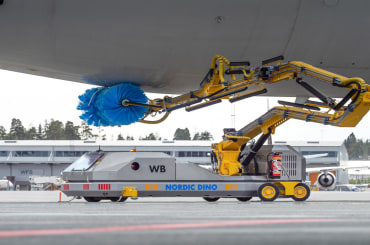
A new report by global agribusiness banking specialist Rabobank suggests that the growing demand for sustainable aviation fuel (SAF) could create significant opportunities for Australian agriculture.
The two-part report on SAF opportunities for Australian agriculture highlights that as airlines strive to reduce emissions, the largest contribution to cutting aviation emissions over the next decade will come from transitioning to sustainable aviation fuel, commonly produced from agricultural products and by-products.
Stefan Vogel, RaboResearch Australia & New Zealand general manager and author of the report, said, “Developing an Australian SAF industry would be beneficial for agriculture, as it could provide another demand outlet for canola, sugar, bagasse (a sugarcane production residue), tallow and potentially grains.”
“And the development of the global SAF industry can further benefit Australian farmers who may become feedstock suppliers to these export markets,” Mr Vogel added.
The report notes that if legislation and value chain settings are right, farmers could also benefit from assistance in their transition to lower-emission farm production.
“The lower the carbon footprint these agricultural feedstocks have, the higher the price premium they are likely to be able to command,” Mr Vogel said, potentially providing “a key accelerator” for farmers and the supply chain to produce lower carbon products.
Within two years, there is planned capacity to produce 17 million tonnes of SAF around the globe, growing to over 25 million tonnes by 2030 – a significant volume equivalent to almost half of the global biodiesel volume in 2023.
The report suggests that demand for SAF feedstocks may play out similarly to demand for feedstocks for the global biodiesel industry, with Australian farmers having benefited from European Union demand for canola and indirectly through price from additional demand for other biofuel feedstocks.
With the biofuel industry likely facing volume reductions in several regions of the world in coming years due to a higher share of electric and alternative-fuel vehicles, the Australian agricultural sector needs a “new demand driver” like SAF, the report says.
Currently, vegetable oil and sugar cane are the most economically-attractive feedstocks in Australia, with grain and ethanol also holding promise. In the long-term future, municipal waste and cellulosic materials could also become viable if the economics of converting those feedstocks into SAF improve.
While Australia’s own SAF industry is still in its infancy, demand for SAF in Australia is expected to rise over time as airlines become more aggressive in their decarbonisation efforts and government financial support helps fast-track investments.
For a local SAF industry to develop and scale to meaningful levels, the report emphasises the need for strong commitment from the aviation industry to use these fuels, supported by legislation focused on carbon reduction.












